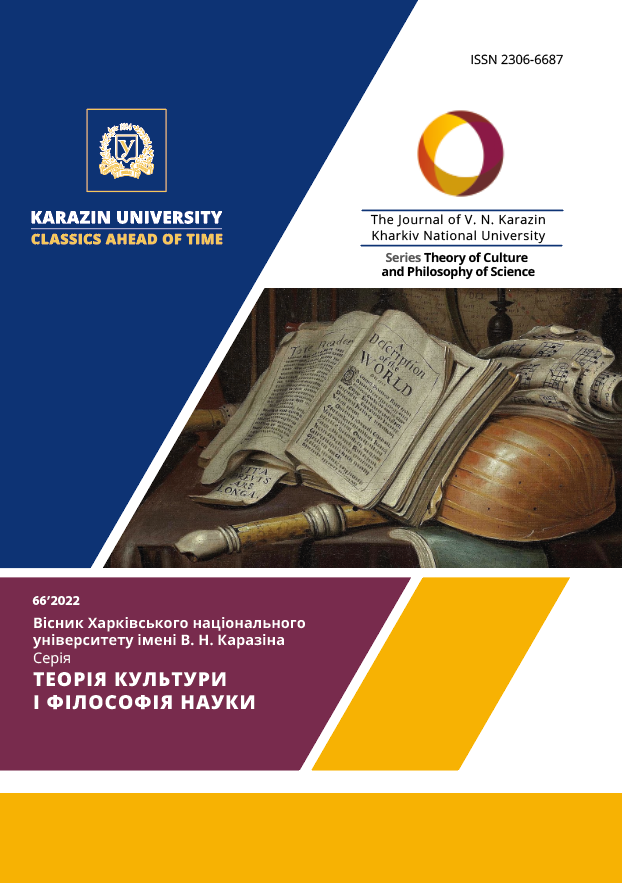ФІЛОСОФІЯ ТЕХНІКИ МІЖ ХХ І ХХІ СТОЛІТТЯМИ ЯК ВІДПОВІДЬ НА ВИКЛИКИ ВІЙНИ І ВИХОДУ ДО НОВОЇ ЦИВІЛІЗАЦІЇ
Анотація
Роздуми про техніку завжди були в центрі уваги науковців. Вони були різноманітними, що привело до диференціації форм рефлексії над технікою. Зміни торкалися, перш за все, онтологічної і гносеологічної концепцій техніки, бо саме вони «вказували» на зміни у ціннісних орієнтаціях культури і, в подальшому, цивілізації, усього людства. Сьогодні суспільство зіткнулося із викликами глобального характеру, коли активними і «безжалісними» стали питання про військову техніку, про військово-технічні зрушення і революції, про те, якою мірою людство стало заручником тих технічний відкриттів, винаходів, які можуть повністю перевернути онтологію і вітальні характеристики людства. Автори підкреслюють, що філософія завжди намагалася розглядати техніку в її єдності із соціально-культурною проблематикою. Питання майбутнього типу цивілізації не викликає жодного сумніву: вона вибудовується за рахунок технічних надбань. Але роздуми над технікою у військовій площині, які відрізняються своєю рефлексією і відкривають нові горизонти значення техніки і технічного, ще раз потребують філософського осмислення такого суттєвого феномену для людства, як техніка.
Питання збалансованого підходу до техніки із відповіддю, що має стати тією могутньою силою, яка стримає деструктивні елементи предмету дослідження, знаходиться в центрі уваги авторів. У перехідний період між ХХ і ХХІ ст. філософія техніки зосереджується на питанні ідей, за рахунок яких має вибудовуваться методологічні лінії дослідження техніки і усього технічного. Очевидність того, що техніка, особливо її військові зразки набувають все більше страшенного, антилюдського характеру, не викликає сумніву. Єдине, що може змінити такі негативні елементи прогресу, ‒ це вирішальне значення духу людини. Саме дух людини має перетворитися на силу, яка має здійснювати контроль над технікою, особливо військовою, а реалізація потужності духу в ситуації сьогоднішнього дня має бути покладена в основу ідеї для оформлення будь-якої методологічної лінії у філософських роздумах про техніку.
Завантаження
Посилання
Movchan, S. P., Chaplyhin, O. K. (2013). Basics of the philosophy of technology and technology: a study guide. Kharkiv: Vydavnytstvo «Fort». 316 p. (In Ukrainian).
Toffler, E. (2000). Third wave. Kyiv: "Vsesvit". 480 p. URL: https://archive.org/details/ p. (In Ukrainian).
Chaplyhin, O. K., Chkheailo, I.I., Prokhorenko, T.H. (2020). Professionalism as a condition for survival in the modern world: a monograph, red. prof. Chaplyhina, dots. I.I. Chkheailo. Kharkiv: KhNADU. 136 p. (In Ukrainian).
Aron, R. (2003). Peace and War. A Theory of International Relations. New York: Routledge. 820 p. (In English).
Baldwin, J.M. (1906). Social and ethical interpretations in mental development; a study in social psychology. New York, London: The Macmillan company. 606 p. (In English).
Chmielewski, A. (2014). Do сzego potrzebna jest filozofia? Filo–Sofija. No. 26. P. 41–54.URL: www.filo-sofija.pl/index.php/czasopismo/article/.../714 (In English).
Department of Defense Appropriations. (1990). FY. Hearings Before the Committee on Appropriations. U.S. Senat. Part 1. National Security. Wash. 270 p. (In English).
Harari, Y. N. (2018). 21 Lessons for the 21st Century. URL: https://www.ynharari.com/book/21-lessons-book/ (In English).
Heidegger, M. Die Frage nach der Technik // Gesamtausgabe Vittorio Klostermann. Frankfurt am Main. Р. 5–36. URL.: https://monoskop.org/images/2/27/Heidegger_Martin_1953_2000_Die_Frage_nach_der_Technik.pdf (In English).
Jaspers, K. (1976). The Origin and Goal of History Westport, Conn: Routledge. 521 р. (In English).
Kaku, M. (2004). Parallel worlds: a journey through creation, higher dimensions and the future of the cosmos. Рublished by doubleday a division of Random House, Inc. DOUBLEDAY New York, London, Toronto, Sydney, Auckland. 428 р. (In English).
Koestler, A. (1989). The Ghost in the Machine. London: Arcana Penguin books. 384 p. (In English).
Lorenz, K. (2002). On Aggression. Translated by Marjorie Kerr Wilson. London, New York: Routledge Classics. 306 p. (In English).
Martin, J. (1989). Telematic Society: A Challenge for Tomorrow. Englewood Cliffs, NJ: Prentice Hall. 213 р. (In English).
McLuhan, M., Fiore, Q. (1968). War and Peace in the Global Village. New York: Bantam. 192 p. (In English).
Мorgenthau, H. (1960). Politics among Nations. The Struggle fer Power and Peace. 3 ed. N.Y.: Alfred A. Knopf. 187 р. (In English).
Rapp, F. The Prospects for technology Assessment // URL: https://link.springer.com/chapter/10.1007/978-94-009-7124-0_10 (In English).
Schlesinger, A.M. (1968). Violence: America in the sixties. New York: New American Library. 96 p. (In English).
Spengler, O. (1931). Der Mensch und die TechnikC. H. Beck, München. 88 S. (In English).
Tarde, G. de. (1903). The laws of imitation. Нью-Йорк: H. Holt and Company. 404 p. v
Wriht, Q.A. (1942). Stude of War. 2 vols. Chicago: Chicago University Press. 212 p. (In English).




